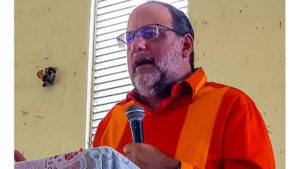 Days after Prime Minister Andrew Holness signalled to Prince William that Jamaica will go ahead with plans to move away from being a constitutional monarchy, Opposition Leader Mark Golding on Sunday reiterated his call for the Government to embrace the process of removing the Privy Council as Jamaica’s final appellate court.
Days after Prime Minister Andrew Holness signalled to Prince William that Jamaica will go ahead with plans to move away from being a constitutional monarchy, Opposition Leader Mark Golding on Sunday reiterated his call for the Government to embrace the process of removing the Privy Council as Jamaica’s final appellate court.
“We are hoping if they are now embracing the idea of full independence, embracing the idea of Jamaica becoming a full republic with a Jamaican as head of State, then let us also embrace the idea of using the CCJ (Caribbean Court of Justice), our regional court, to replace the UK Privy Council,” Golding told the media. He was responding to a query, from the Jamaica Observer about the issues discussed during the private session of the party’s National Executive Council (NEC) meeting on Sunday. The meeting was held at the Manning’s School in Westmoreland.
Golding said the legislative process was started by the then People’s National Party (PNP)-led Government and is only in need of the governing Jamaica Labour Party’s (JLP) support.
“We want the CCJ as another powerful and strong Caribbean institution designed and built for the Caribbean people. That only needs a two-thirds majority of both houses and no referendum for that. That legislation has already been developed because we brought it to Parliament, but at that time the JLP did not see it fit to support it,” he said.
Golding questioned the effectiveness of the Privy Council in meeting the needs of Jamaicans.
“We do not have access to justice for our people, in terms of access to a final court because, if you look at the number of cases going to the UK Privy Council, the last couple of years, it has been two per annum and that is because it is very difficult to take a case there. It costs a lot of money to do it and we need a visa to do it, as your lawyer does if your lawyer is a Jamaican,” he argued.
“Jamaica has already put its full contribution into the endowment fund that supports the Caribbean Court of Justice. We pay for it. We use the court to settle treaty issues arising under the Treaty of Chaguaramas, which is the Caricom treaty. So let us use it as our final court as other countries in the Caribbean have been reaping the benefits of it,” added the Opposition leader.
He pointed to the CCJ being adopted by Barbados, Belize, Dominica, and Guyana as their final court, which is accessible by utilising technology to visit a country if necessary and, more importantly, does not require a visa from people seeking its services.
While Jamaica has made it clear that it intends to remove the monarchy, the long-standing issue of reparation for Britain’s role in slavery has been reignited with the recent visit of the Duke and Duchess of Cambridge, William and Kate, to Jamaica. The trip was part of their eight-day tour of the Caribbean in recognition of The Queen’s platinum jubilee, celebrating her 70 years on the throne.
The Opposition leader noted that, while Prime Minister Andrew Holness is committed to removing the monarchy, Holness had told him that there is a two-year timeline in mind. However, Golding, a lawyer, is of a different view. He believes it can be completed within the year.
In December, then Attorney General Marlene Malahoo Forte — who is now the minister of legal and constitutional affairs — told the Observer that Holness had given instructions for the constitution to be amended. She said a document is currently being prepared, and by the end of the second quarter of this year, Jamaica’s way forward to becoming a republic will be made known.
The last major review of the constitution took place in 2010, at that time, the Charter of Rights and Freedoms was amended.
